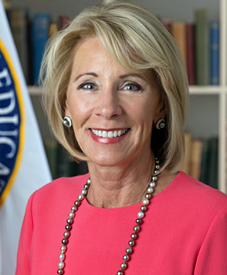DeVos announces plan to revamp Obama administration guidance on campus sex assault investigations

Education Secretary Betsy DeVos/U.S. Department of Education
Declaring that “the era of ‘rule by letter’ is over,” Education Secretary Betsy DeVos announced Thursday that Obama administration guidance on campus sexual assault will be replaced following a notice-and-comment process.
The system established by the prior administration “has failed too many students,” including accused students denied due process, DeVos said in prepared remarks for an appearance at George Mason University. Politico, the Washington Post and BuzzFeed News have coverage.
The U.S. Department of Education’s Office for Civil Rights had issued a “Dear Colleague” letter in 2011 that said sexual violence should be included among the offenses banned by Title IX of the Education Amendments of 1972. The letter said schools should use a preponderance of the evidence standard when making determinations about sexual harassment.
“Washington has burdened schools with increasingly elaborate and confusing guidelines that even lawyers find difficult to understand and navigate,” DeVos said. “Schools have been compelled by Washington to enforce ambiguous and incredibly broad definitions of assault and harassment.”
DeVos described “the current reality” of how colleges handle sexual assault investigation. When a student reports a sexual assault, if he or she isn’t urged to keep quiet, the case goes “to a school administrator who will act as the judge and jury.”
“The accused may or may not be told of the allegations before a decision is rendered,” DeVos said. “If there is a hearing, both the survivor and the accused may or may not be allowed legal representation.
“Whatever evidence is presented may or may not be shown to all parties. Whatever witnesses—if allowed to be called—may or may not be cross-examined. And Washington dictated that schools must use the lowest standard of proof.
“And now this campus official—who may or may not have any legal training in adjudicating sexual misconduct—is expected to render a judgment.”
Parties may or may not have the right of appeal. “It’s no wonder so many call these proceedings ‘kangaroo courts,’” she said.
DeVos referred to findings by an ABA Criminal Justice Section task force, which concluded both the accused and the accuser should have due process protections when colleges and universities resolve allegations of campus misconduct. Schools should find the task force recommendations useful, she said.
Related articles:
ABAJournal.com: “Federal guidelines on campus sexual misconduct ‘seriously overbroad’ say some Harvard law faculty”
ABAJournal.com: “Department of Education seeks delay in Title IX case while it reviews guidance”
ABAJournal.com: “Law grad sues Department of Education over its guidance on campus sexual-misconduct investigations”
ABA Journal: “Lawyers are dealing with changing rules on college sexual assault”



